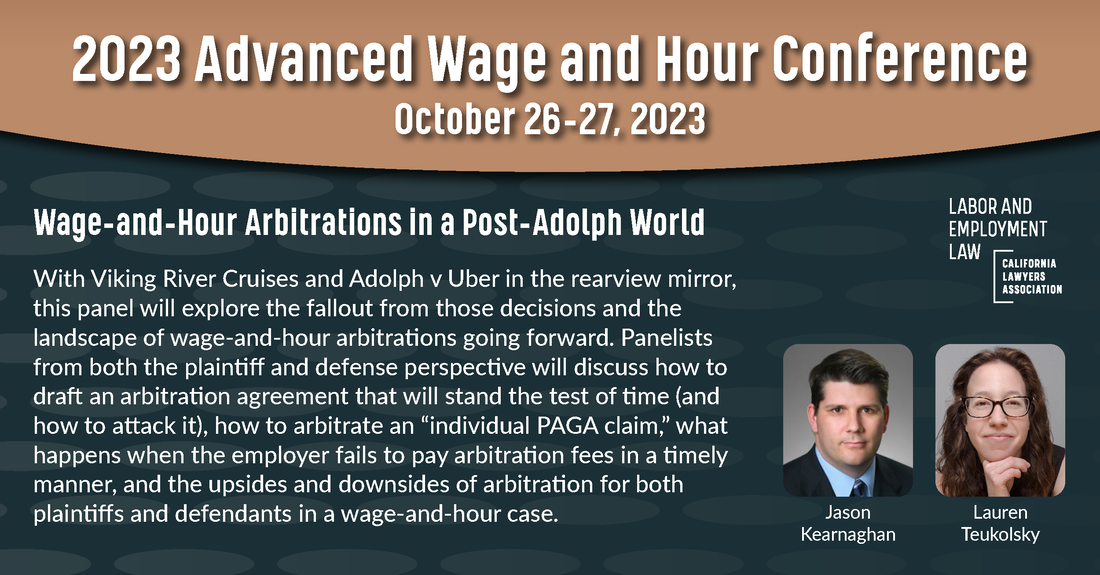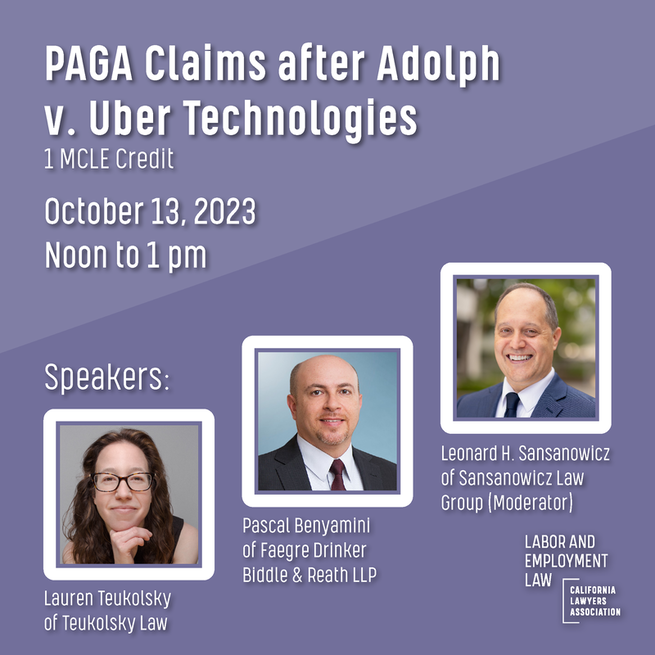|
Lauren Teukolsky was quoted in a Wednesday Bloomberg Law article about a recent Ninth Circuit opinion that discuss the effects of the California Supreme Court’s decision in Adolph v. Uber on PAGA cases proceeding in federal court. The Ninth Circuit ruled that federal courts are bound to follow the California Supreme Court’s interpretation of PAGA standing, and do not need to follow the U.S. Supreme Court’s mistaken interpretation of PAGA standing in its 2022 Viking River Cruises decision.
In the Circuit Court’s decision, Judge Kenneth Kiyul Lee stated in his concurring opinion that arbitration proceedings under PAGA may not constitute a “full and fair opportunity to litigate,” thus offering a potential exception to arbitration proceedings’ preclusive effect on their associated court proceedings. In other words, if an employer were to receive a worker-friendly ruling from an arbitrator, that ruling may not have bearing on the analogous issues the employer is litigating in court. How much of an effect Judge Lee’s opinion will have on California’s employment law landscape is still unclear. In Bloomberg Law’s article, Ms. Teukolsky says that the state’s appeals courts are still divided on the issue and have yet to “’squarely’” consider whether individual PAGA arbitration findings will impact group PAGA claims. “’It’s too soon,’” Ms. Teukolsky says in the article. The article also includes Ms. Teukolsky’s commentary on how Judge Lee’s opinion might be interpreted for the benefit of workers: “The logic in Lee’s concurring opinion could also help claimants wield the ‘full and fair opportunity to litigate’ argument against adverse arbitration findings when their group PAGA claims unfold in court, Teukolsky said.” Ms. Teukolsky has represented workers for over two decades and her commentary on the latest developments in employment law is regularly featured by major publications such as Bloomberg Law, Law360, Law.com, and the Los Angeles Times. To access the Bloomberg Law article in its entirety, click here. To learn more about Ms. Teukolsky’s practice and get in touch with the firm, click here.
0 Comments
Legal Dive quoted Lauren Teukolsky last week in an article discussing the Department of Labor’s (DOL) new independent contractor rule. The long-awaited rule was released on January 9th and replaces the DOL’s Trump-era guidance as to employee and independent contractor classification.
The issue of classification has become especially important over the past five to ten years as the American “gig economy” has taken off. With the rise of companies such as Uber and DoorDash, more employers are utilizing workforces that consist of independent contractors. From employers’ perspectives, the development is positive, as it allows them to avoid expenses associated with employees, such as worker’s comp insurance. For employees, however, failure by their employers to properly classify them as employees frequently means a denial of basic workplace rights such as minimum wage, overtime, and paid leave. The DOL’s new rule seeks to reduce the risk that employees are misclassified as independent contractors by instituting provisions it believes are more consistent with judicial precedent than those previously put in place during the Trump administration. Legal Dive’s article begins with commentary from Ms. Teukolsky on how corporations may need to navigate the new rule, which is set to go into effect on March 11: “’You need to assume that most of your workers are employees, unless it’s pretty clear that they’re not, and not the other way around,’ said Lauren Teukolsky, who represents workers at Teukolsky Law. ‘It’s definitely the safest course.’” Ms. Teukolsky also commented that the Trump-era rule deviated from longstanding employment-law principles, and the DOL’s new rule represents a return to the well-established legal principles that existed for decades. To read Legal Dive’s article in its entirety, click here. To learn more about Ms. Teukolsky and Teukolsky Law, click here.  On Wednesday January 31, Lauren Teukolsky will appear as a panelist on a California Employment Lawyers Association (CELA) roundtable discussing PAGA cases in the aftermath of Adolph v. Uber Technologies, Inc. Ms. Teukolsky will be joined by co-panelist Adrianne De Castro, a Senior Associate at Desai Law Firm, P.C., and a member of the litigation team in Adolph v. Uber. The pair’s roundtable will address how courts are handling employer requests to stay PAGA claims pending individual arbitration, and recent appellate court rulings and trial court orders illustrating how courts have dealt with PAGA since the landmark decisions Viking River Cruises, Inc. v. Moriana and Adolph v Uber. Ms. Teukolsky and Ms. De Castro will also discuss how to oppose motions to compel arbitration of PAGA claims, poison pill provisions in arbitration agreements, and issue preclusion, among other topics. Ms. Teukolsky is an expert in employment law and regularly appears on panels to discuss the latest developments in the field. Most recently, Ms. Teukolsky spoke about Viking River Cruises and Adolph v. Uber at two talks presented by the California Lawyers Association (CLA). CELA is a statewide organization of 1,200 California attorneys who devote the majority of their practices to representing employees in individual employment cases and class actions. CELA works to protect and expand the legal rights of workers through litigation, education, and advocacy. To register for CELA’s Adolph v. Uber Roundtable, click here. To learn more about Ms. Teukolsky and her firm, click here. Lauren Teukolsky’s “Wage and Hour Case Notes” were published in the November 2023 edition of the California Labor and Employment Law Review. Ms. Teukolsky’s column describes seven new decisions from California and federal appellate courts that affect wage-and-hour law. Among the cases are significant rulings regarding reimbursements for pandemic era work-from-home expenses, arbitration exemptions for transportation workers, time entry rounding, and one of the first appellate applications of Adolph v. Uber, among other topics.
Wage-and-hour law is an ever-changing field with new appellate decisions that often reshape the legal landscape. Ms. Teukolsky has navigated those appellate decisions for over 20 years and is an expert in both state and federal wage-and-hour law. She speaks frequently on wage-and-hour topics at national and state conferences and is regularly quoted by media outlets for her insights on the topic. The California Lawyers Association (CLA) is a voluntary statewide bar association. Its mission is to “promote excellence, diversity and inclusion in the legal profession and fairness in access to justice and the rule of law.” Ms. Teukolsky’s “Wage and Hour Case Notes” are published on a quarterly basis by CLA’s Labor and Employment Law Section. To read Ms. Teukolsky’s article in its entirety, click here. If you would like to speak with Ms. Teukolsky about a wage-and-hour matter, click here. Lauren Teukolsky will speak on an October 26th panel at the California Lawyers Association’s (CLA) 13th Annual Advanced Wage and Hour Conference. The panel will explore the effects of Viking River Cruises and Adolph v Uber on the legal landscape, particularly with respect to wage-and-hour arbitrations. Ms. Teukolsky will represent the plaintiff’s perspective while co-panelist Jason Kearnaghan, a partner at Sheppard Mullin, will represent the defendant’s views.
The two panelists will explain how to draft and attack arbitration agreements, how to arbitrate individual PAGA claims, and the upsides and downsides of wage-and-hour arbitration for plaintiffs and defendants, among other topics. Ms. Teukolsky regularly discusses the latest employment law developments at conferences and panels. In September and October, Ms. Teukolsky shared insights on Viking River Cruises and Adolph v Uber for a trio of talks hosted by the Alameda County Bar Association, the Beverly Hills Bar Association, and the California Lawyers Association. Her commentary on the two cases has also been featured in articles by the Daily Journal, Bloomberg Law and Law.com. CLA is a nonprofit, voluntary bar association serving thousands of licensed attorneys throughout California. Its Labor and Employment Law Section serves as a networking and educational forum for California’s labor and employment lawyers and non-lawyers with an interest in the field. To register for CLA’s 13th Annual Advanced Wage and Hour Conference, click here. For more information about Teukolsky Law, click here. Lauren Teukolsky was quoted in a Thursday Law360 article on California’s newest U.S. senator, Laphonza Butler. Butler was appointed by Governor Gavin Newsom and sworn in earlier this month to fill the seat of Dianne Feinstein, who passed away after representing California on Capitol Hill for over three decades. The Law 360 article discusses Senator Butler’s background, and her mixed experience regarding workers’ rights.
Butler’s greatest achievement for California’s workers came during her time as president of SEIU (Service Employees International Union) Local 2015, where she helped with the “fight for $15,” a movement that led to 2016 California legislation that eventually increased the state’s minimum wage to $15 an hour. Afterwards, however, Butler joined the private sector and worked for Uber, a company that has gone to great lengths to avoid having to classify its drivers as employees. The corporate background has led to some concerns regarding Butler’s commitment to workers. In Law360’s article, Ms. Teukolsky expressed cautious optimism about Butler: “’Her time working in corporate America was relatively brief, if you look at the entirety of her career,’ Teukolsky said. ‘She does seem to be progressive and have workers' rights at the forefront, and hopefully whatever time she spent working for Uber was an aberration or a blip.’” To read the Law360 article in its entirety, click here. To learn more about Lauren Teukolsky and Teukolsky Law, click here. On Tuesday, October 10th, Lauren Teukolsky will appear on an MCLE webinar hosted by the California Lawyers Association (CLA). The program is titled, “PAGA Claims after Adolph v. Uber Technologies,” and will unpack how the California Supreme Court’s summer ruling in Adolph will affect claims under California’s Private Attorneys General Act (PAGA). Ms. Teukolsky will speak alongside Pascal Benyamini, a Labor and Employment partner at Faegre Drinker Biddle & Reath LLP. Leonard H. Sansanowicz, founder of Sansanowicz Law Group, will moderate the discussion.
Ms. Teukolsky is a frequent speaker on employment law topics. In September Ms. Teukolsky was selected to moderate a session at CELA’s (California Employment Lawyer Association) 36th Annual Employment Law Conference. In the months prior to the conference, she discussed PAGA claims in a pair of webinars for the Alameda County Bar Association and Beverly Hills Bar Association. Her commentary on the effects of Adolph on PAGA claims was also recently featured in articles by Bloomberg Law and Law.com. CLA is a nonprofit, voluntary bar association serving thousands of licensed attorneys throughout California. Its Labor and Employment Law Section serves as a networking and educational forum for California’s labor and employment lawyers and non-lawyers with an interest in the field. The Tuesday program will begin at 12 pm PT. For information on how to attend the program, click here. To learn more about Ms. Teukolsky’s work, click here.  Lauren Teukolsky will speak on a Beverly Hills Bar Association (BHBA) webinar on August 22 on the future of California’s Private Attorneys General Act (PAGA) following the state’s highly anticipated Supreme Court ruling in Adolph v. Uber Technologies, Inc.. Chris Jalian, a Partner at Paul Hastings, LLP, will join Ms. Teukolsky on the webinar. Nazgole Hashemi, Co-Founder of LegalAxxis, Inc., will serve as moderator for the event. The webinar will examine what the Adolph v. Uber ruling means for employees and employers, with Ms. Teukolsky representing the employees’ perspective and Mr. Jalian representing the employers’ perspective. In the ruling, the Court held that California’s workers could continue to pursue PAGA labor claims on behalf of their coworkers even if their individual labor claims were forced into arbitration. Experts considered the ruling to be a big win for the state’s workers. Ms. Teukolsky’s commentary on Adolph v. Uber was previously featured in several articles by Bloomberg Law and Law.com. The BHBA’s Labor and Employment section will present the webinar. The section provides a forum for labor and employment attorneys and neutrals to network, share ideas, and learn about the latest issues and trends in the field. The webinar will take place on Tuesday, August 22 from 12:30 pm to 1:30 pm PT via ZOOM. To register, click here.  Lauren Teukolsky was quoted by Bloomberg Law and Law.com in a pair of articles this week on the CA Supreme Court’s Monday decision in Adolph v. Uber Technologies, Inc.. In the highly anticipated ruling, the Court held that the state’s workers could continue to pursue representative PAGA labor claims even if their individual labor claims were forced into arbitration. The Court’s ruling is considered a huge win for California’s workers. PAGA (Private Attorneys General Act) is a state law that authorizes employees to collect civil penalties for violations against themselves and their coworkers on behalf of California’s Labor Commissioner, which has struggled to manage a backlog of cases for the past several decades. Arbitration is a private dispute resolution process that overwhelmingly favors employers and shields corporations from public scrutiny and accountability. Employers frequently require their employees to sign agreements stipulating that all claims made by them will be resolved in private arbitration as opposed to being litigated through the courts, a process that is public and more favorable to workers. A ruling in Uber’s favor would have made it very difficult to bring PAGA cases forward – due to the prevalence of arbitration agreements – and would have seriously eroded workers’ ability to enforce the state’s labor laws. Uber’s lawyers have indicated that the company is considering appealing the Court’s decision. According to analysis Ms. Teukolsky published on LinkedIn, the U.S. Supreme Court is unlikely to hear such an appeal, especially in light of its 2022 decision in Viking River Cruises, Inc. v. Moriana. She said, “It's unlikely SCOTUS will hear a case from a state supreme court involving entirely state-law issues; there must a federal question involved.” Ms. Teukolsky has represented workers for over two decades and her commentary on the latest developments in employment law is regularly featured by major publications such as Bloomberg Law, Law360, Law.com, and the Los Angeles Times. To access the Bloomberg Law article in its entirety, click here. To access the Law.com article in its entirety, click here.  Lauren Teukolsky’s commentary was featured this week in a Bloomberg Law article on a pending case before the California Supreme Court, Adoph v. Uber Techs, Inc. The case is being closely monitored by both employee-side and management-side attorneys because of its potential ramifications for PAGA (Private Attorneys General Act) litigation. In the case, California’s highest court will decide whether aggrieved employees maintain standing to bring “non-individual” PAGA claims against their employers on behalf of similarly aggrieved employees when their individual claims are sent to arbitration, a private, quasi-court forum that is favored by employers. If the Court rules that such employees maintain their standing, it will clear the way for many employees to continue enforcing the state’s labor laws through PAGA, a 2004 state law that authorizes employees to collect civil penalties for violations against themselves and their coworkers on behalf of California’s Labor Commissioner, which has struggled to manage a backlog of cases for the past several decades. If the Court rules in Uber’s favor, the outlook for the state’s employees would not be so favorable. The Bloomberg Law article states: “A ruling in favor of Uber allowing claims to be split into individual and non-individual components could make it more difficult to bring PAGA cases forward, said Lauren Teukolsky, a plaintiff’s lawyer and founder of Teukolsky Law in Pasadena, Calif. ‘It’s going to make PAGA litigation much more cumbersome,’ she said. Teukolsky expects the court to rule this summer or in early fall.” Ms. Teukolsky also discussed why forcing employees to arbitrate claims is detrimental to them: “Teukolsky said that arbitration comes at a cost for employees because they waive their civil rights, such as the right to a jury trial and the right to an appeal, when they are asked to sign an arbitration agreement,” the article states. The case follows the U.S. Supreme Court’s 2022 decision in Viking River Cruises, Inc. v. Moriana in which a concurring opinion by Justice Sonia Sotomayor said that California courts should have the final say in whether employers can force arbitration for representative claims. To read the article in its entirety, click here. |
AuthorLauren Teukolsky is the founder and owner of Teukolsky Law, A Professional Corporation. Archives
June 2024
Categories
All
|
Teukolsky Law, A Professional Corporation, represents clients throughout California. Ms. Teukolsky is admitted to practice in the State of California, as well as the United States Supreme Court, Ninth Circuit Court of Appeals, Northern District of California and Central District of California. Disclaimer.
Copyright © 2017
Copyright © 2017




 RSS Feed
RSS Feed